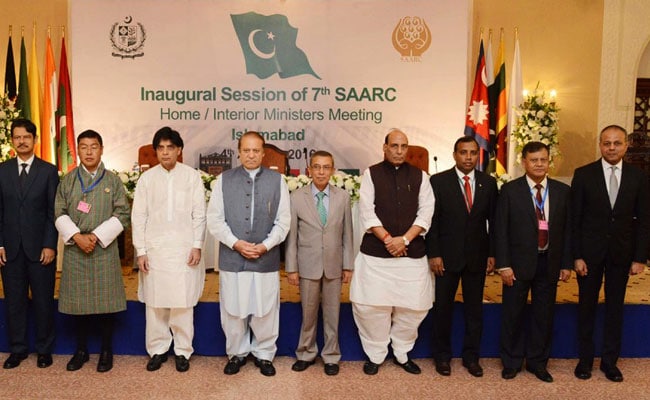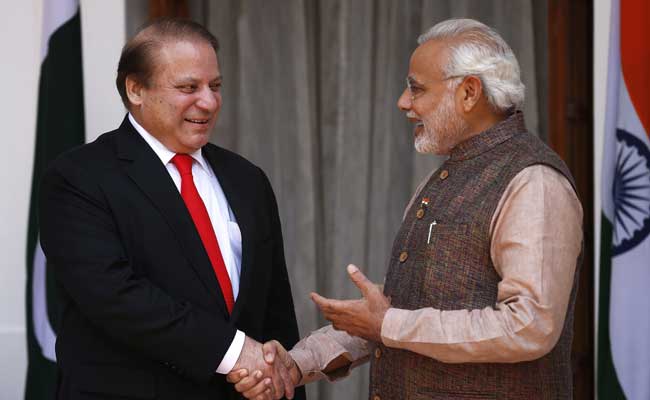No serious country allows terrorists, religious criminals and radicals who clearly threaten world peace to run up and down the avenues of its capital while an international conference is on. An unembarrassed Pakistan did just this when it permitted Hafeez Saeed to parade his hate very close to the venue of the SAARC home/interior ministers' meeting. Saeed is founder of the Jamaat-ul-Daawah and along with Masood Azhar of the Jaish-e-Mohammad, one of Pakistan's two best-known start-ups, backed by state venture capital funding.
Like P Chidambaram, who travelled to Islamabad in the summer of 2010, about 18 months after the horror of 26/11 for a previous SAARC interior ministers' conference, Rajnath Singh was crossing the Radcliffe Line at a difficult juncture. The aftermath of the Pathankot attack has been testy, especially as Pakistan has refused to cooperate despite sending its investigators to India and being given access to the Pathankot air force station. All pretence of reciprocity and facilitating Indian questioning of suspects and masterminds based in Pakistan has been dispensed with.
While there were missteps earlier, since December 6, 2015, when the two National Security Advisors met in Bangkok, the Modi government's Pakistan policy has been consistent. A certain degree of contact and communication will be persisted with, but the focus is on conversation related to terrorism and security. The principal interlocutors are the NSAs, and even when foreign secretaries and diplomats may meet, the stress is on terrorism and intelligence sharing. Political room for a larger comprehensive/composite dialogue cannot be created till there is evidence of Pakistani advance on India's terrorism-related concerns, at the very least acting on those who plotted Pathankot and 26/11.

Pak Prime Minister Nawaz Sharif and Home Minister Rajnath Singh with delegates after the inauguration of the SAARC Home Ministers' conference (AFP photo)
As home/interior ministers mandated with internal security, the gathering that Rajnath Singh addressed was appropriate to his message. Also Islamist terrorism now threatens not just India but also Afghanistan, Pakistan, Bangladesh and the Maldives. In recent decades, Sri Lanka has suffered from terrorism from the Tamil Tigers. The Tigers too had sympathisers (including sections in India) who tended to confuse cold-blooded killers with so-called martyrs.
Why did India send Rajnath Singh and not a junior minister or even a civil servant instead? After all, the Bangladesh Home Minister didn't go, in keeping with a pattern of difficulty in Dhaka-Islamabad relations. There are two reasons. First, there was little to gain by giving Pakistan a reason to plant headlines alleging India had conspired to lead a boycott of an innocent multilateral meeting on Pakistani territory. India has emerged as a country that plays with a straight bat. This may not solve anything, least of all change the world's perception about Rawalpindi's alleged utility in the war against extremism, but India has to bash on regardless.
Rajnath Singh's visit also sets the stage for Prime Minister Modi's participation at the SAARC summit later this year. Unless there is a major "incident" in the intervening period, Modi is likely to make that trip and his Home Minister has in a sense laid the ground for him.

In December, PM Modi made a surprise stopover in Pakistan on his way home from Afghanistan
Just how obstreperous Pakistan has been should be apparent from its sabotage of the proposed "SAARC satellite", aimed at improving telecommunication capacity in the region as well as helping with other developmental issues. Early in his term, Modi had offered to build and launch the satellite as a common resource for SAARC. India has the most advanced space programme in the Association.
The satellite, expected to be launched at the end of 2016, will now be called the South Asia Satellite, as Pakistan has dropped out and vetoed the "SAARC" moniker. India has carried on, in acknowledgement of its "SAARC minus one" back-up plan. That plan entails continuing to participate in SAARC and continuing to move ahead in spite of Pakistan, and sometimes continuing to do so even while on Pakistani soil.
(The author is distinguished fellow, Observer Research Foundation. He can be reached at malikashok@gmail.com)
Disclaimer: The opinions expressed within this article are the personal opinions of the author. The facts and opinions appearing in the article do not reflect the views of NDTV and NDTV does not assume any responsibility or liability for the same.


